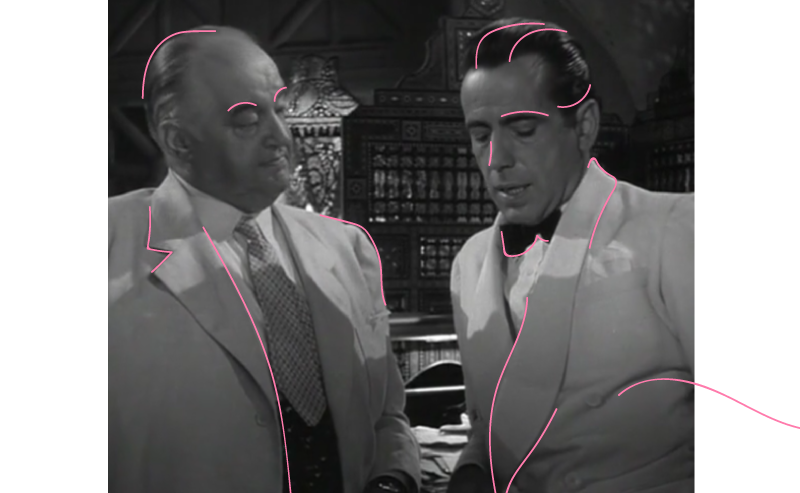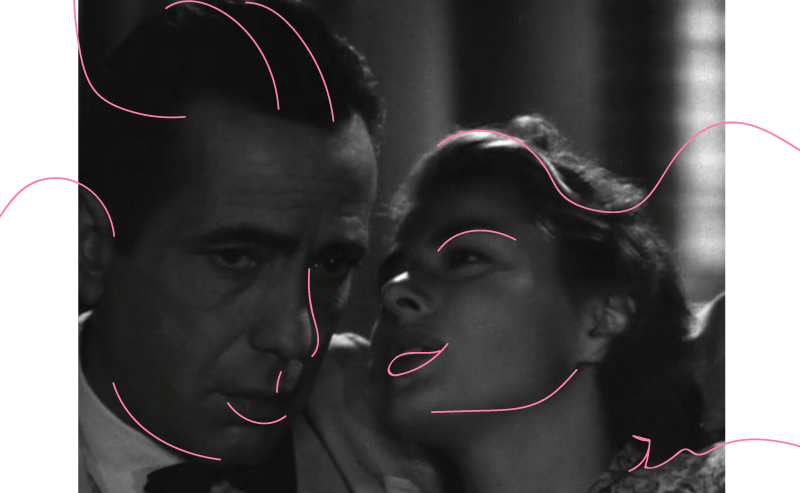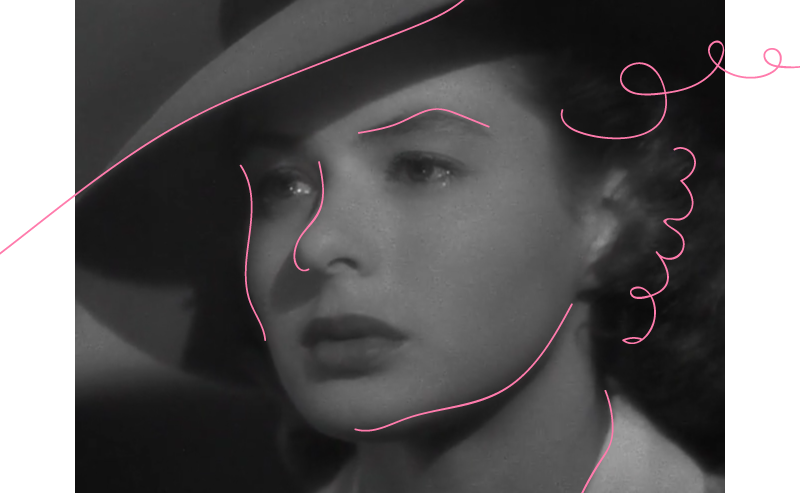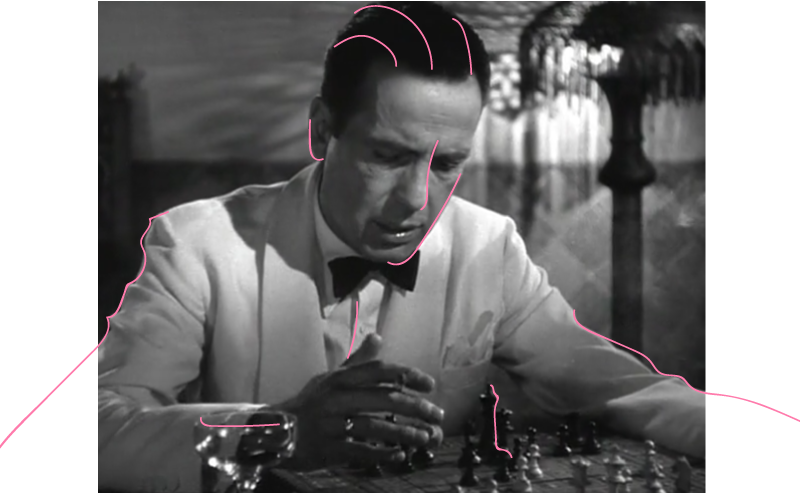Arguably America’s favorite film, as measured by various polls over the years, Casablanca turned 75 in November. Special screenings have been held across the country. Encomiums have appeared in periodicals. But perhaps it’s time to take stock of this fan favorite.
Its appeal is well earned. The plot is full of surprising twists and tense moments. The story is uplifting: a cynical, bitter American expatriate running a nightclub (called “Rick’s Café Americain”) in Vichy-controlled Casablanca is inspired by the reignited love of a woman to take incredibly brave steps, including renunciation of future bliss with his lover, to help a great resistance leader escape his Nazi pursuers. Its leads, Humphrey Bogart and Ingrid Bergman, have two of the most cinematic faces in the history of the medium. Claude Rains, perhaps a more skillful actor than both of them, has a strong secondary role. The cast includes the great character actors Sydney Greenstreet and Peter Lorre, and lesser-known but excellent ones such as John Qualen and S.Z Sakall. The director, Michael Curtiz, knew how to use the camera to underscore emotions. There are some great laughs. The film’s setting is exotic, reeking with promise of intrigue and adventure. In essence, it is a film about moral redemption, regained love, courage, and personal sacrifice for the greater good. What’s not to like?
Here’s what: the film is tainted by undercurrents of racism and sexism that would not be tolerated in a film that has less going for it than Casablanca. You may think me a scold for calling attention to this. But recognizing and acknowledging it might illuminate issues much in the news today.
Of its two unfortunate sentiments, racism is the less obtrusive, expressed more in absences than what’s expressed on the screen. Superficially, the relationship between Rick (Bogart) and his Black, piano-playing helper Sam (Dooley Wilson) is one of equality. In Paris (an episode told in flashback), Sam, Rick, and Ilsa (Bergman) share champagne together. Rick and Sam get drunk together and go fishing together (not in the time of the movie but apparently before). Sam can tell Rick what’s on his mind. But Sam is only a sidekick at times; he is for the most part an employee, and his attitude toward Rick sometimes borders on servile. He is almost always sitting down at the piano, playing what Rick or Ilsa orders him to play. Sam calls her “Miss Ilsa.” He calls Rick “Boss.” They call him “Sam.” She at one point refers to him as “the boy.” When, in the flashback, Rick intends to meet Ilsa at a train station to flee about-to-be-occupied Paris, Sam is tasked with carrying two heavy suitcases through the rain to the station. Rick has a single, lighter one.
So far, these offenses are of the age. But there’s more. Sam is apparently a strong draw for Rick’s nightclub, because the owner of a rival establishment, The Blue Parrot’s Signor Ferrari (Greenstreet), covets him. He asks Rick how much he would take for Sam. Rick responds stiffly, in a tone of self-righteousness, “I don’t buy or sell human beings.” Moments later, as he passes by Sam at the piano, Rick smugly pats him on the shoulder in manner that looks, no doubt unintentionally, condescending. But worse, Sam disappears from the last third of the movie. And from Rick’s life. At the end of the film, when Rick sells his café to Ferrari, he includes Sam in the deal. In other words, Sam is sold. And with no apparent consultation, no goodbyes.

Unlike Sam, Captain Renault (Rains), ostensibly Casablanca’s prefect and a friend of Rick’s, is in the movie until the end. He is a likable character if you don’t think about him too much. He bends with the prevailing winds, obeying his Nazi overseers, because, he admits, he has no convictions. But we get the impression that he dislikes the Germans and, were he brave, would side with Casablanca’s own resistance movement. He’s corrupt, but acknowledges his corruption. He tolerates gambling in Rick’s café because he enjoys gambling, especially because Rick lets him win. He is charming, diplomatic, and amusing. At one point in the movie, the Nazi commander, angry at a spontaneous display of Free French patriotism in the café, orders Renault to shut the café down immediately. Renault blows his whistle and orders the café closed. As a pretext, he utters what are probably the most quoted two words in the history of film, exclaiming he is “shocked, shocked” to learn that gambling has been taking place. At that very moment, a clerk comes up to him with a wad of bills and says, “Your winnings, Sir.” “Thank you,” Renault replies as he pockets the money. It is a very funny moment.
Renault has a vice far more serious than petty corruption or gambling. His position in Casablanca gives him the power to issue life-saving exit visas — for a price, which for attractive young women, married or single, is sex. This is acknowledged at least three times in the movie. A young Bulgarian wife asks Rick if Renault can be trusted to keep his word to give her and her husband exit visas in exchange for, it is implied, secret sex with her. After Rick instructs his roulette wheel operator to rig it so that woman’s young husband has enough money to pay for the visas himself, Renault expresses annoyance, telling Rick that he expects a lovely young woman in his office the next day, and it would make him very happy if she loses at roulette. Another time, in his office, Renault is told that an attractive woman is waiting outside. Renault straightens his tie, grins, and says, “Show her in.”
Renault makes us laugh, but the sexual blackmail he habitually engages in is even worse than that which has brought Harvey Weinstein and many others under harsh opprobrium of late. In exchange for sex, Weinstein, for instance, allegedly dangled potential stardom or threatened career stagnation — or both at the same time. Renault offered life-saving exit visas from Nazi-dominated French Morocco. Were he real, Renault would be judged the worse of the two. You can recover from career setbacks, sexual humiliation, or even rape, but not from death.
Renault’s coercive sexism is played for laughs — can we really find that funny today? — but the film seems unconscious of the subtler sexism in its depiction of Rick’s relationship with Ilsa. Early in the movie, shortly after Ilsa, with whom Rick has had a passionate affair in Paris but who he thinks jilted him, has suddenly shown up in Casablanca, Rick behaves toward her with teenage bitterness, implying that she’s little better than a whore. Although at least ten years his junior, she is the mature one. All that’s on her mind at this point is getting her heroic, internationally known, Resistance-leading husband Victor Laszlo safely on a plane out of Casablanca. But later, when she visits Rick for a second, desperate time to ask his help and backs it up with a gun, she cannot pull the trigger. She confesses that she still loves Rick, and after explaining why she abandoned him in Paris, why she married Laszlo, and why they made their way to Casablanca, she and Rick make love. (Some of the explanation and all the sex are implied by a fade out and fade in that together last about three seconds.) Afterwards, Ilsa confesses that she doesn’t know what to do and buries her head on Rick’s shoulder. “You’ll have to think for both of us,” she says helplessly. “All right,” Rick assures her. “I will.”

We’re pretty sure that, thinking for them both, he’ll come up with a clever plan. The first time we see Rick in the movie, he is engrossed in a game of chess with an imaginary opponent. We also probably suspect the plan will somehow serve the cause of the Resistance, because we have learned through what other characters have said that Rick once ran guns to Ethiopia (for the fight against Mussolini, presumably), that he fought on the Loyalist side during the Spanish Civil War, and that there was a price on his head in Nazi-occupied Paris. And we even might guess that the plan will be generous to those around him. While his café is shut down, he keeps his employees on salary. When his roulette dealer blunders and loses a large sum, Rick tells him to forget it and pats him on the back. And, of course, he lets the young Bulgarian win enough to buy exit visas for his wife and himself. He is brilliant, serves the right causes, and is something of a private saint.
Rick constructs an elaborate plan (which is revealed even to us only at the last moment) to get Laszlo and Ilsa on a plane to freedom. He keeps the plan secret from everyone, including Ilsa. She thinks Rick has arranged for Laszlo to escape alone, with her staying behind with Rick. That’s what we think, too. When he sells his café to Ferrari, he insists that his key employees will still have their jobs and that Sam will be paid more than Rick had paid him. But once at the airport, he sends Ilsa off with Laszlo. While Laszlo is out of earshot, Rick explains to her that Laszlo needs her in order to persist in his heroic work. Here, Rick gives his famous speech about how “the problems of three little people don’t amount to a hill of beans in this crazy world.” As Ilsa gazes at him lovingly, he adds, “Someday, you’ll understand that.”
Think about that. Ilsa has followed Laszlo all across France, and perhaps other countries, helping him with his vital work and eluding, with him, capture by the Nazis. She has exhibited great courage and devotion to a cause. In Casablanca it is she, not Rick, who is the grown-up. Only after what we presume has been a passionate night of sex with the married Ilsa — for a depiction of how passionate one movie-goer imagined it, read Robert Coover’s short story, “You Must Remember This” — does Rick, as Ilsa melts in helplessness, act maturely. He does the thinking for both of them, and sees her off, out of his life, while assuring her that someday she will be capable of understanding why he did this.

Many great films from Hollywood’s golden era, which I regard as the 1930s through the 1950s, depict with at least tacit approval attitudes and actions (such as calling African-Americans “boy” or “colored”; slapping sassy women; “mansplaining”; smoking; drunkenness) that we find embarrassing today. We tend — or ought, in my view — to give most of these films (or at least the great ones) a pass, on the grounds that they express unconsciously the times in which they were made. To condemn them is like condemning great men like Lincoln or Washington, or great documents like the Declaration of Independence or the U.S. Constitution, for reflecting some of the wrongs of their era. But there’s a difference with Casablanca. Casablanca excuses offenses that at the time of its making were regarded as serious sins — selling humans; granting life in exchange for sex. It excuses them in the name of a higher cause. In the film, the specific higher cause is fighting Nazi Germany. But would either be necessary to defeat the Germans? Did the Allies sell humans or trade life for sex in order to win the war? Of course not, and the film makes no claim of a direct relationship. The Nazis are just a stand-in. The higher cause in Casablanca is the Higher Cause. It’s being Politically Correct (in the original, Leninist sense of the term), on the Right Side of History, or riding the Arc of History. It gives you cover to engage, with a clear conscience, in conduct normal people would regard as disgraceful or evil. If you serve the Higher Cause, then everything else is permitted, to paraphrase Dostoevsky. And anyway, Lenin explained, you can’t make an omelet without breaking eggs. When Renault saves Rick’s life in the end and the two of them walk off to fight the Nazis, all is forgiven, if it wasn’t already. And for Rick, being on the right side means you get to have adulterous sex hot enough to last for a lifetime, you get to sell your Black piano player without so much as a goodbye, you get to act secretly as the all-knowing central planner, treating the lives of others as chess pieces.
Casablanca is arguably one of the subtlest examples of Bolshevik propaganda produced in the era of the Soviet Union. Its effectiveness owes much to it being unintended as such and not easily recognizable as such. If it had a conscious political aim, it was to get Americans to commit to fighting the Germans. Who, except Germans, could object to that? A sense of entitlement, however, was enjoyed by Hollywood’s top men then (as now), and a large percentage of them were Communist party members, strongly left-leaning, or progressive. They probably, unconsciously, believed that the ends justified not just the means but anything else on the side, as long as your work was serving a noble cause. Witness how people like Weinstein and their defenders cite the progressive causes they serve or now will serve. Witness how most progressives protected them in the past and how many men and women defend them still. This may explain at least in part why so many viewers even now give Casablanca a pass on its racism and, especially, sexism. But the sudden torrent of claims of sexual abuse that liberal women are now making against powerful progressive men may signal that identity politics in feminist form is shoving progressive ideology aside, or at least that the two are locking horns.

I don’t believe the filmmakers (writers Julius and Philip Epstein and director Curtiz) were conscious of the film’s ideological message. For one reason, a sense of entitlement was enjoyed by Hollywood’s top men then as now. Many of them, unconsciously, believed not just that the ends justified the means but also that the ends justified things unrelated to achieving the ends. The ends entitled you. Power is an aphrodisiac which, when combined with utopian ideology becomes, apparently, extremely hard to resist. Second, the production was notoriously rushed and haphazard, the scriptwriting ahead of the filming only by days, a condition ripe for inconsistencies. That might explain, for example, why Rick, who until the great sex was far less mature than Ilsa, assures her that someday she’ll understand the wisdom of his words. The third reason is that if they had consciously intended the worst aspects of the film’s underlying message, the filmmakers would have disguised it better — or they would have made a clunkier, much duller film, which would come off today and perhaps even then as crude propaganda (like, say, Mission to Moscow, made a year later by the same director, or like Brecht’s 1930 play The Measures Taken, which justified the Moscow show trials almost before they began, or Odets’s 1935 Waiting for Lefty, unwatchable today). They at least would have made it less obvious to anyone who pays attention. No selling Sam. No “Show her in.” No “Someday you’ll understand that.”
From the forgoing, you might assume I hate the film. Casablanca’s flaws are more serious, potentially more damaging, than the flaws of other great films of its era. Nevertheless, I don’t hate it and can’t condemn it. I’ve seen it many times and enjoyed every viewing. Bogart is magnetic, Bergman luminous, the story gripping. And the key characters do the right thing in the end. (Sam will be paid more than twice as much in his new employ.) The ideological leanings of a cultural movement, such as the old Hollywood, almost always intrude on a work, even a work of genuine art. We should no more condemn Casablanca than condemn or ban Huckleberry Finn, The Tempest, or Heart of Darkness, three great works once under attack (unfairly) for wrongthink. Although its offenses are worse, Casablanca has rich storytelling, complex characterizations, and powerful cinematic technique. It is a great film with a deep flaw. •
All images created by Emily Anderson. Screen captures provided by author.




